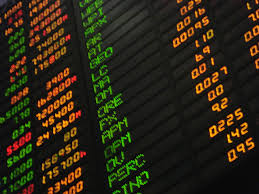Illusion of Control
You're a natural born sucker for the illusion of control bias . . . and apparently so is everyone else with a human nervous system.
An unidentified illusion of control has been tied to
- trading too often
- entering questionable positions
- putting too much money in one or a few positions
- not using exit strategies.
It is dangerous because even when you know it exists, it is intrinsically rewarding feel in control.
Situations with uncertain outcomes crank up your nervous system ranging from heightened attentiveness, to excitement, to anxiety, to panic.
You need to have a plan for sidestepping this bias and understanding more of what's going on should help with that.
The brain has been described as having a hunger for patterns

In a Sunday New York Times article, Gamblers, Scientists and the Hot Hand , George Johnson shows how this affects our perceptions in such seemingly unrelated activities as coin tossing, free throw shooting, slot machine gambling and scientific studies.
If you would like to delve more deeply into this topic, take a look at Fire in the Mind: Science, Faith, and the Search for Order by George Johnson
It has also been described as wanting to be able to stop thinking.
From this perspective your brain's job is to learn how things work so that it knows what to do next time you confront something like this so that you don't have to re-invent the wheel over and over. It turns on an autopilot function.
The problem comes when it concludes that it's got this one figured when in fact there is no pattern and the autopilot gets you lost.
It's only too easy to conclude that you've found the holy grail pattern that always results in profit when the three, four, or five times in a row that it has worked is well within the expectations of chance.
Certain conditions are known to increase an illusion of control

- Choice - It is well known that people will play the lottery more often and bet more when they are allowed to pick their own numbers. Likewise, when you choose what to invest in and how to put into each position you are set up to underestimate the odds of sustaining a loss.
- Outcome Sequence - Early positive experiences lead you to overestimate the chances that subsequent ones will also be positive. Hence the warning that too many highly successful trades too soon lower your chances of profiting consistently over the longer term.
- Task Familiarity- The more you do something the more you are likely to feel in control of process.

- Information - The more information that is used in making a decision, the greater the illusion that are controlling the outcome.

- Active Involvement - The personal effort that you put into an endeavor, the more likely you are to believe that you have more control than you actually do. This may account for why smart, hardworking people who have earned enough money to invest mistakenly assume that they can apply the same tactics to succeeding in investing.
Is there any way around this field of stumbling blocks?
If it's automatic thinking patterns that are most likely to draw you into an illusion of control, then being conscious that you are risk and crafting procedures that take into account your probable odds is the best choice.
- Be aware that this apparently is how we're wired up.
- Give up the idea that there is a secret pattern, a holy grail, that wins all the time.
- Look for edges, ways to get greater than chance odds in your favor.
- Use backtesting to get an idea of what your odds of gains actually are
- Once you've found an edge that works for you, concentrate on executing that strategy as efficiently and as often as you can.
Copyright @ 2008 - 2018 Better-Relationships-Over-50.com